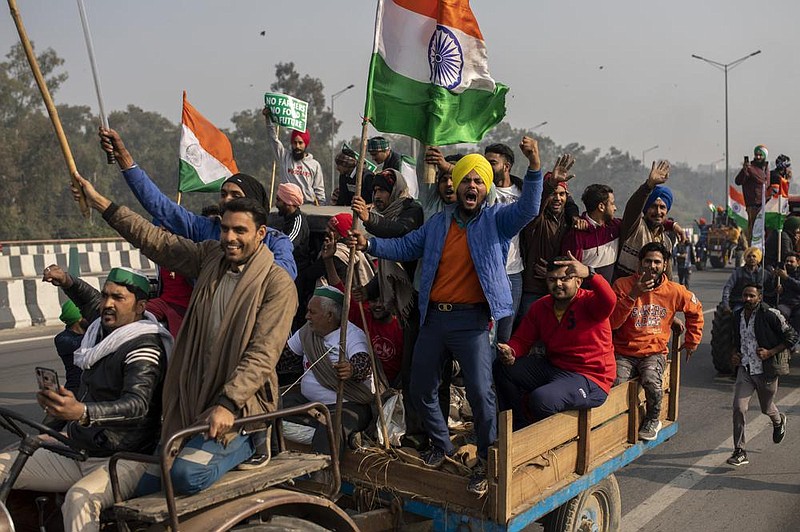NEW DELHI -- Thousands of protesting farmers poured into New Delhi on Tuesday, using their tractors to pull apart barricades and challenging government forces who fired tear gas, blocked internet access and charged demonstrators with bamboo sticks to bring some order to a capital that felt under siege.
It was the most violent escalation in two months of generally peaceful protests that have tested the government of Prime Minister Narendra Modi in unprecedented ways, forcing it to offer concessions to aggrieved farmers on new market-friendly laws that were intended to overhaul the country's agriculture sector. But the farmers have insisted on nothing short of repealing the laws that were pushed through parliament in September, leaving them, they say, vulnerable to corporate greed.
The deadlock boiled over in what -- for Modi at least -- was an embarrassing showdown that came on a national holiday and in the midst of a pandemic and economic slowdown that have also challenged his leadership.
As Modi, in a red turban, saluted his officers and watched his country's latest warplanes fly over a grand parade marking 72 years since India's inception as a republic, protesters riding atop tens of thousands of tractors were dismantling barricades and rumbling toward the city center.
By late evening, at least one person had died and many parts of the city seemed unnerved. Farm leaders, who had promised their march would be peaceful but had clearly lost control, distanced themselves from the violence and appealed to the protesters to return to the campsites they have occupied for the past two months at the capital's borders.
Delhi police said 86 members of its force were wounded.
"Farmer agitators broke the agreed terms and started their march much before the agreed time," Delhi police said in a statement. "The agitators chose the path of violence and destruction."
Several rounds of talks between the farmers and the government over the new laws failed to bring a resolution. By choosing to carry out the tractor march on a day that eyes would be fixed on New Delhi for the parade (guests in previous years included the presidents of the United States, Russia and France), the farmers were aiming for a show of force.
But by the end of Tuesday, attention was focused on the chaos and clashes, and it was unclear whether the farmers had flexed their muscles or weakened their position. Until now, their cause had drawn wide popular support for how disciplined the tens of thousands farmers had remained during two months camping out in the cold and rain.
As the farm protests have grown in size in recent weeks, Modi's government offered to amend some parts of the new laws, which it said were intended to inject private investment into the troubled sector. The country's highest court also intervened, ordering the government to suspend the laws until it found a resolution with the protesters.
But the farmers said they would not take anything less than a complete repeal, and pressed on with their tractor march into the city. The government even made a failed, last-ditch effort to get the high court to restrain the farmers on security grounds.
Tensions were high leading up to Tuesday, with some officials claiming that the protests had been infiltrated by insurgent elements who would resort to violence. Just days earlier, the farmers' leaders brought in front of the media a young man they claimed to have detained on suspicion of plotting to shoot the leaders and disrupt the rally. Neither set of claims could be independently verified.
On the eve of the event, leaders of the farming unions insisted that they would carry out a peaceful march with about 150,000 tractors, and that more than 3,000 volunteers would ensure the routes negotiated with Delhi police would be followed. Maps of the routes suggested a compromise that could allow the protesters to enter the city but not get close to sensitive institutions.
The farmers even announced their next event: a march on foot to the Indian parliament on Feb. 1, when the country's new budget will be presented. Whether that protest will proceed after Tuesday's violence was unclear.
"Remember, our aim is not to conquer Delhi, but to win over the hearts of the people of this country," the farmers said in instructions posted online for marchers, who were told not to carry weapons -- "not even sticks" -- and to avoid provocative slogans and banners.
"The trademark of this agitation has been that it's peaceful," Balbir Singh Rajewal, one of the movement's main leaders, said late Monday. "My request to our farmer brothers, to our youth, is that they keep this movement peaceful. The government is spreading rumors, the agencies have started misguiding people. Beware of it."
"If we remain peaceful, we've won," he added. "If we turn violent, Modi will win."
